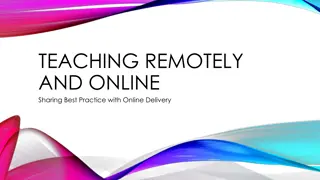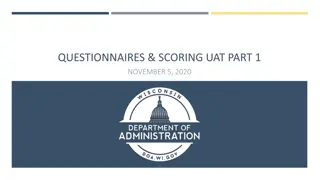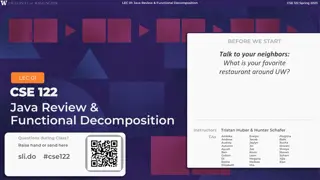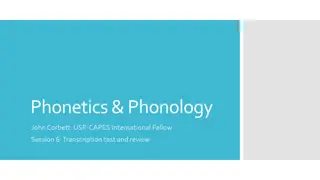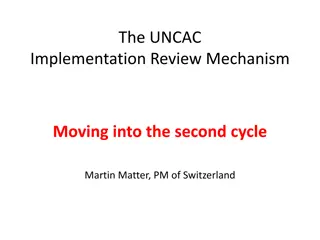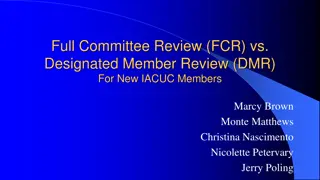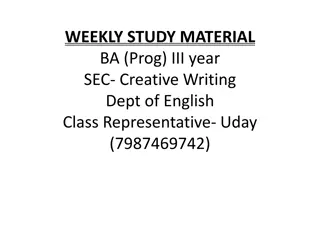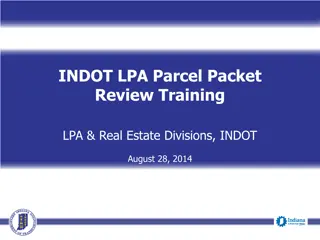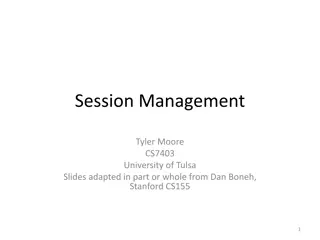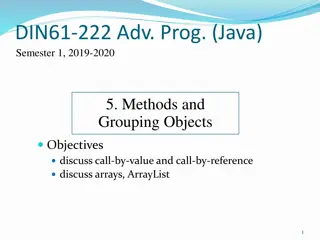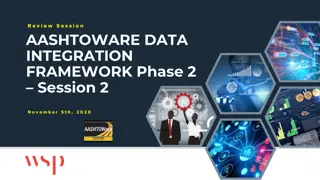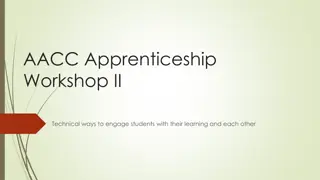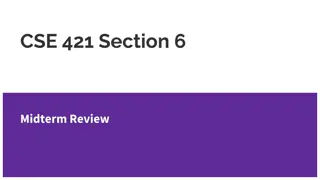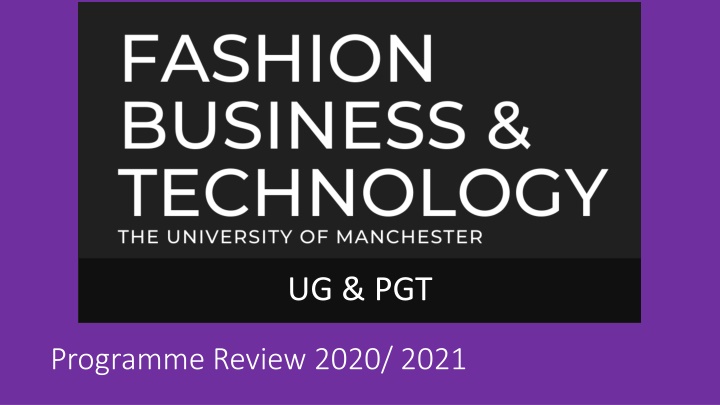
Strategies for Engaging Live Sessions in Academic Programs
Explore effective strategies for structuring, delivering, and engaging in live academic program review sessions. Learn how to keep students actively involved, promote inclusivity, and enhance learning outcomes through various interactive activities and tools.
Download Presentation

Please find below an Image/Link to download the presentation.
The content on the website is provided AS IS for your information and personal use only. It may not be sold, licensed, or shared on other websites without obtaining consent from the author. If you encounter any issues during the download, it is possible that the publisher has removed the file from their server.
You are allowed to download the files provided on this website for personal or commercial use, subject to the condition that they are used lawfully. All files are the property of their respective owners.
The content on the website is provided AS IS for your information and personal use only. It may not be sold, licensed, or shared on other websites without obtaining consent from the author.
E N D
Presentation Transcript
UG & PGT Programme Review 2020/ 2021
What makes a good 'live' session Structure, Content & Delivery What were your best bits from your lives ? Having a structure for the session helped keep me on time Clear - stick to time / manage expectations Link the live to the asynchronous and dig deeper break out rooms brilliant and easy to do even for me. Students enjoyed being in groups and i let them go back their groups at the end of the session breaking it down into small set of activities Having different activities during the lives to keep changing the pace and ensure students engaged. Using padlet, menti, kahoot etc.to facilitate discussion for each activity.. Lives were my highlight. Enjoyed the opportunity to explore a broader range of issues with students. Cameras off didn't detract from the shared energy of having everyone together in time This isn't strictly a live session. But the online workshops linked to the assessments worked the best in small groups. Some staff did old style lectures, and they were well received. We also ran some research paper sessions. That was quite good. It depends on your teaching style. Personally I found the online workshops linked to coursework with students sharing work to be the best live sessions. Get the balance right. how much preparation that we expect students to do before attending the live session? I followed the pre-recorded structure to reinforce which seemed to work well Always started any of my lives with a discussion point, related to the unit but maybe a news item or an activity keeping it very light then moved into a recap of the videos. The discussion used the chat. Then activities that used padlets and menti. however still didn't get full engagement - lots of watching students
What makes a good 'live' session Engagement What were your best bits from your lives ? Allow the room to stay open so students can "hang out" -encourage them to Diverse student cohorts - we need to think about inclusivity and accessibility issues Show your family pet for extra engagement give student enough time to think about the questions for the discussion before asking them to answer Best Bit- In sourcing & Distribution- it was a small number of students enrolled and therefore we could try out 'groups', we put them in groups with friends, gave them a task to complete and present at the end off the session. We received really positive feedback, students stated they were pleased to be in groups where everyone talked and contributed and felt they were achieving a new skill. This did not work in large core units. Chat is good for responses, but it is usually the same students who engage. Quieter students send direct messages, but anonymous Padlet can be helpful I liked that students already knew the basics of the content from the videos meaning that we could have some interesting discussions and focus on examples more during the live - consolidating their knowledge and understanding For my PGT unit I found that more students engaged providing their opinions and own examples through the chat function than they've ever done on campus - they seem more confident typing than speaking out loud (obviously it's very daunting to speak in front of everyone in a big lecture theatre) and I don't mind if they engage by their real voice or the chat function, it's just nice when they do respond and take part in the discussion! It was great that the students had watched the videos and were familiar with the content. I used to do activities on campus e.g. menti discussion but the we could discuss in a lot more depth this year as they had time to digest the information. I also agree with the chat box comment, students that would not normally speak on campus used the chat function during the lives.
What makes a good 'live' session? What were your challenges ? Time management..sessions went so fast student camera's being turned off booooooo, understand re EDI though why they did lack of videos and engagement makes it hard to not simply deliver a class Challenging when students did not interact in live sessions (eg: PG) - no cameras, no input on chat, etc. Challenges: Students wouldn't engage with Chat, it was always the same ones, answering. How to get get students active participation is critical. Accessibility usual - getting students to engage
Other hints and tips We also ran several seminars at once and got 1 student per group to report back to the main room student collaborating and developing exam revision resources Non-interactive teaching strangely popular (for UG but especially PGT) Although I tried to make all my classes dynamic and interactive, I got many positive comments when I simply taught content and students sat and listened in a passive manner. Maybe this is just because it was a change from interaction? But worth noting.. need to use more peer feedback Don't aim for perfect videos / recordings - aim for good. We wouldn't stress about being 'human' in an on-campus lecture - cut ourselves some slack
Technology & Software Activities via Googledocs produced some great shared resources - saved as pdf to BB later we used Google slides on IFR in sem 1 and meant we could set tasks and then very easily get students to feedback in the session Google forms.. and they can be embedded on to the blackboard jamboard worked well too, we did a task to reflect past work, and make them reflect on the assessment criteria I found the polls within Zoom were really easy to use and got some very quiet students to share their knowledge but also their questions and opinions Some good input from students on Padlet students engage well with polls and padlets but hard to get them to speak up, Students also enjoyed live quizzes on Kahoot & Quizziz Using the tablet was useful during iives for drawing on slides and getting students input Vizualizer very effective for bringing ideas together to display common themes from discussions loved the idea of the visualiser but ended up not using it - wished i had but needed more confidence using it.
Feedback Formative and Summative clarity in terms of formative feedback modes (informal / formal) formative feedback with large cohorts on the core units. trying to work out activities that can be done whilst they are waiting for formative feedback times! I found formative feedback sessions quite hard to coordinate and make really effective - they worked better on campus. We did individual group sessions for formative feedback on our group assignment - meeting each group separately on Zoom - students seemed to appreciate this Formative feedback sessions definitely challenging esp with high numbers - we managed on strat marketing by allocating drop in times but many students did not need to come!
Challenges for Academics preparing content for blended learning & delivery Recording videos, uploading, processing, editing subtitles all takes lots of time Editing videos take time and a new skill to acquire Recording and uploading takes time. Sound quality on a couple of recordings was truly terrible and needed re-doing. Creating the powerpoints and the videos was time consuming - obviously it being the first year of doing this so its always going to be the hardest Development of materials (and subsequently updating them) is not captured in our workload, but is essential to the vast majority of our content. This must be recognised in the workload to encourage staff to keep updating materials - who is planning on updating their videos ready for next year?? takes hours and hours recording material each week when you are several different units Yes agree with comments on how long it takes to develop and record videos and also develop the whole weekly package of video material, independent study task, seminar material and slides for lives. it isn't just the pre-recorded videos, the additional material for the live session, independent study tasks and online seminars all added to the workload. Development of material is in the workload model It takes time initially to set up blackboard and then upload videos, embed into Blackboard but hopefully we can transfer this year's units over so that we at least have the template
Challenges - Marking time it takes to mark and provide feedback - might be an issue with too much marking coming in all the time The time taken to mark everything in 15 working days (and even less for exams) when balancing it with creating content / other duties marking workload excessive, a sliding scale for feedback number of 'days' would be good especially as we are now increasing numbers The marking workload is a lot, we need to look at alternative assessment types for more efficient assessment and effective feedback Blackboard is very clunky and also does not show similarity in the same manner as TurnitIn Rubrics in Blackboard that also help to score submissions speeded up marking quick marking of exams using pre-designed standard comments for feedback Marking- the exam rubrics were really helpful to speed up the marking. It will be useful for the 48hr exam too and to ensure consistency/ manage student expectations
AOB - things we need more info on . online etiquette and expectations from students recording of live sessions - can exclude those that do not wish to be recorded Need some clarity/ consistency on whether to record live sessions or not resources needed to make recording easier lack of equipment and/or technology available How to improve attendance rates of students? Can we change the assessment methods? It would be great to know if the university has any guidelines / rules on showing examples of students work from previous years. Menti was really good but we can only use it twice, in a session. Can we get a licence, I prefer it to Padlet.



